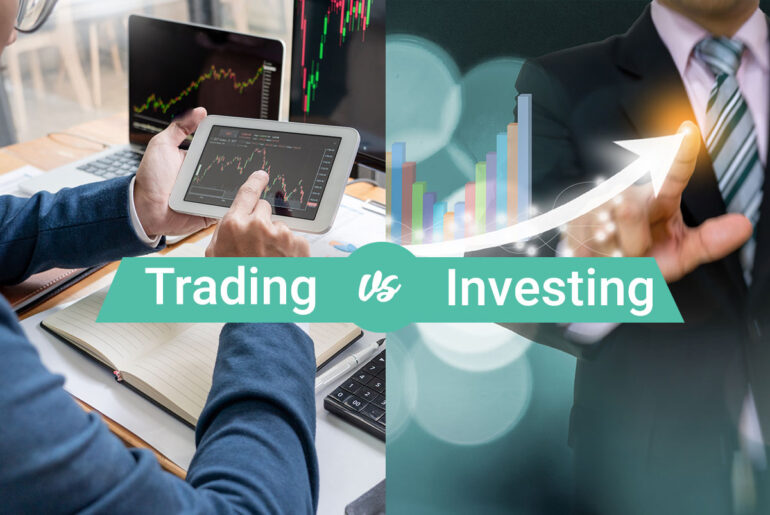The stock market is a huge world and millions of people have benefitted from it over a period of time. There are 2 types of people in the stock market, Traders and Investors. These 2 people have very different objectives when it comes to making money in the markets. Read on to know about the difference between an investor and a trader.
Investor
Investors have the objective of building wealth gradually over an extended period of time. They achieve this through the buying and holding of a portfolio of stocks, mutual funds, bonds or any other investments. The objective is to hold these investments for a long period of time and then sell them at a very high price later on. Investors are playing on the Power of compounding which enhances return over a long period of time. Do read our blog about the ‘Power of Compounding’ to know how it affects an investor’s returns. These investments are held for years or maybe even decades depending on the type of investment and the growth it has shown in the past.
Investors give preference to the fundamentals of the company analyzing the business model, P&L, Balance sheet, Cash flows and sometimes even speaking to the management to understand what and how does the company creates value for its stakeholders in the long run. Investors generally try to find the intrinsic value of a company using various fundamental analysis models like Free Cash Flow to the Firm (FCFF) or Free Cash Flow to Equity (FCFE) and analyze if a company is undervalued and if it is then they buy it in order to profit from price growth in the future. Fundamental analysis models would require another blog to completely explain their concept.
The underlying point is that investors have a long term horizon and they try to benefit from the power of compounding as and when the company performs well in the future.
Trader
Traders have a very short term view and are looking to benefit from short term mispricing in the market. Trading involves more frequent transactions involving buying and selling of stocks, currency, bonds, or any other financial instruments. The time horizon could be as short as a minute to as long as a year but the investing has a much longer time horizon. Traders could benefit from buying low and selling high in a rising market while selling high and buying low in falling market (this is also called as ‘short-selling’)
Even a trader can be classified based on the time horizon that she is trading the instruments for. They are generally classified into 4 categories.
- Position trader: Positions held from months to years
- Swing trader: Positions held from days to weeks
- Day trader: Positions held throughout the day with no overnight positions
- Scalp trader: positions held for seconds to minutes with no overnight positions
Traders choose their trading style based on various factors like risk tolerance, account size, amount of time that can be dedicated to trading, level of trading experience and much more.
Whether trading or investing is better is an age-old question and no one has been able to conclusively answer this question. Both have their strengths and weaknesses. In the end, it also depends on the personality of a particular person and his needs.
Traders are usually the ones who do it for a living earning regular profits to run their families. Investors, on the other hand, don’t earn regular profits due to the buy and hold strategy.
To get a better perspective, trading is like a T-20 match where the skillful players are supposed to hit as many runs as possible in a short 20 overs. Whereas investing is like a test match where they cant play with too much risk. They should have proper technique and play the long game.

Whether trading or investing is better is an age-old question and no one has been able to conclusively answer this question. Both have their strengths and weaknesses. In the end, it also depends on the personality of a particular person and his needs.
Traders are usually the ones who do it for a living earning regular profits to run their families. Investors, on the other hand, don’t earn regular profits due to the buy and hold strategy.
To get a better perspective, trading is like a T-20 match where the skillful players are supposed to hit as many runs as possible in a short 20 overs. Whereas investing is like a test match where they cant play with too much risk. They should have proper technique and play the long game.
Following are the differences between trading and investing:
- Period: Trading is done usually for very short periods like a month or mostly a day. Traders try to benefit from short term price fluctuations. Investing, on the other hand, works on the buy and hold a principle. Investors invest their money for years or sometimes even decades or longer. Short term price fluctuations don’t matter in investing.
- Capital growth: Traders usually try to earn money by timing the market, i.e. placing their trades at the right time whereas investing is about earning from compounding returns by holding quality stocks for a long period of time.
- Risk: Both trading and investing involve high risk, however, due to the short term nature of trading, it involves slightly more risk because short term fluctuations can really affect a traders’ return. Markets in the long tend to be relatively stable.
Another important is that a trader does not consider the fundamentals of a stock and just focuses on price and which direction it is going to move and try to benefit from her viewpoint. Investors have to consider the fundamentals of the company and look at all the parameters of fundamental analysis.
Investing also requires having a portfolio approach which means having a well-diversified basket of stocks with good exposure to various sectors of the economy. Then the investor should choose how much weight she wants to give to each sector and each stock within that sector. We have made that job easier for you by creating such a portfolio with the just-right kind of weights to each sector and stocks that have been researched with all fundamental analysis techniques. Please check out our product StockBasket for more information.





